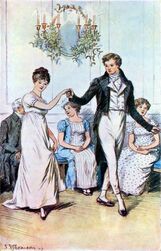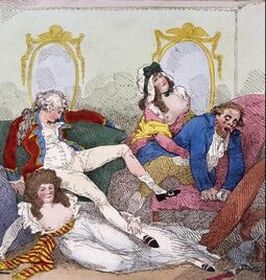| Clutching My Pearls is about Jane Austen and the times she lived in. Those who speak of the past mainly to condemn but also want to rescue Jane Austen from the dustbin of history have a bit of a dilemma on their hands. Click here for the first in the series. My "Six simple questions for academics" post is here. |
 Admired by Lord de Grey
Admired by Lord de Grey Here, for example, is another novel featuring a sweet and faultless Fanny as its heroine. This story has some “remarkable similarities” to both Mansfield Park and Johnson’s essays about Misella the prostitute. But this novel does not have a radical anti-patriarchal theme, as we will see.
In Fanny, or, the deserted daughter (1792), Fanny Vincent, a girl of unknown birth (it's complicated) is raised in the home of a baronet, Sir Peter Sinclair, and is looked down upon by the baronet’s daughter...
 The Prince Regent setting a bad example
The Prince Regent setting a bad example Fanny’s guardian, Sir Peter Sinclair, a baronet, is so debauched that after his wife’s death, his home “was by turns the prey of gamblers, parasites, and harlots. Women, were, however, his prevailing passion, and his house was perpetually filled with a tribe of loose, disorderly, females, who excluded all better company, and fixed a stigma on Sinclair-house…”
This is rather similar to Mary Crawford’s situation in Mansfield Park; after her aunt dies and she has to leave her uncle’s house because he brought his mistress to live with him openly. I think there are other similarities too, but I'll leave them for Austenites to spot.
Augusta Sinclair, the baronet’s daughter, is actively cruel to Fanny. After her mother--who was Fanny’s protector—dies, Augusta maliciously downgrades her from companion to waiting woman. Augusta discontinues Fanny’s piano lessons as not suitable for her station in life. Fanny "determines to relinquish all accomplishments" except needlework. She has to eat with the upper servants and is constantly reminded of her dependent position.
Fanny grows into a beautiful young woman and Augusta’s father, Sir Peter, notices. He holds a ball for the neighbourhood and gives Fanny a gift of some diamonds for her hair and his own miniature portrait, set in diamonds, for her to wear to the dance. The gift makes Fanny feel awkward. She doesn’t want to wear the jewelry to the ball, but Sir Peter insists.
From there, the plot diverges from Mansfield Park and is more like Johnson's essay about Misella. After the dance, (where everybody notices Sir Peter's attentions to Fanny and rumours start to circulate about her), Sir Peter tells our vulnerable, dependent heroine that she has a choice: she can become his mistress and be well-rewarded, or, he will take her by force. He carries her off to a remote farmhouse where he has taken other girls in the past. Mary, a young servant, helps her escape in time.
Fanny finds work as a governess in London but, as is typical with novels of this type, she encounters cruelty through no fault of her own. The problem is, she is a beautiful girl and there are two young men in the house: Edmund and Matthew, who are, to say the least, distracted by her presence in the household. Edmund in particular pursues her, but she wants nothing to do with him. He is boastful and speaks wildly, rather like John Thorpe in Northanger Abbey. The women of the household resent her and want her out.
Then Fanny is offered a home by a society lady, but she goes from the frying-pan into the fire. She is preyed upon by a new admirer, Lord Montraville. Fanny repels his attempts to seduce her, and he feels guilty, which is a new sensation for him.
So let's compare the fictional Fanny Vincent to Dr. Johnson's Misella of my previous post. Both are penniless dependents. Both are pressured by their guardians into becoming kept women. Misella succumbs, but Fanny, though utterly powerless, has moral agency. She flees and tries to support herself. The tension and drama centers around Fanny being able to maintain her chastity. And we can add that Misella's story has the stamp of reality, while Fanny's story is a Cinderella fantasy, because of what comes next.
| Never mind the why and wherefore, love can level ranks and therefore.... | Love Can Level Ranks? Lord de Grey, the nobleman next door, loves Fanny and begs her to marry him. She hesitates because she knows his parents won't approve. She calls herself "the unknown offspring at best of penury, perhaps of vice and infamy." In other words, she doesn't know if she comes from a good family and in fact she was probably born out of wedlock. Lord de Grey declares that he doesn't care: “Oh! Miss Vincent, you cannot imagine that motives of no real consequence will ever outweigh with me the real happiness of the heart; that feeling the most blessed of men in your society, in your love, the whole world could offer any thing to my mind which could teach me to know regret.” Here is an outright declaration that love levels ranks. Love conquers all. The class system doesn't matter. |
After a lot of weeping and angst, Lord de Grey persuades Fanny to marry him in secret. Yes, Lord de Grey marries Fanny not knowing who she is. Can the author really intend such an egalitarian message?
Not really. Because soon after the marriage, we have the Big Reveal, which re-asserts the social order. By virtue of an amazing coincidence, Fanny meets the one woman who knows who her parents are. Lord Montraville is actually her dad! Of course Fanny is blue-blooded and the offspring of legal marriage.
So we have it both ways: the message of Fanny, a deserted daughter is that love conquers all but also that bloodlines and family matter. Lord de Grey couldn't possibly have fallen in love with, say, the daughter of the dustman. The English class system is vindicated, just as occurs in The HMS Pinafore (1878). Nothing much changed with foundling plots.
| "Love has never crossed such boundaries of class." | The author of Fanny, or, a deserted daughter does not like dwelling on guilt and misery any more than Jane Austen. This author resolves the storyline with a lesson about forgiveness. There is no comeuppance for the repugnant Sir Peter. The heroine, out of Christian charity, "cordially forgave" him, "willingly losing all remembrance of intended injury in gratitude for former favours" (i.e. she forgives the fact that he abducted her and was going to take her by force, because he paid for her upbringing and education.) And he is repentant because he is ill and will soon meet his Maker. Fanny (now Lady de Grey) also forgives Lord Montraville, not only for trying to seduce her when he didn't know she was his daughter, but because she got misplaced, so to speak, as a baby. |
Augusta, who made Fanny's life miserable when she was a poor nobody, is not repentant but the author makes sure that her life is hollow and tawdry. Now married, Augusta had "neither sense nor principle," and "[h]er character was totally lost, while she appeared in all public places... covered with jewels, exceedingly rouged, and attended by the minions of the present moment."
This novel, though bizarre to modern sensibilities, contained nothing to offend the reviewers of the time. The anonymous critic writing in the Monthly Review approved of the “moral tendency of the tale.” The author herself loftily declared in her preface, that if she were “conscious of a single line inimical to the interests of virtue, she would burn the book, rather than present it to the public, though she were sure of being celebrated as the first novel-writer of the age.”
| Fanny, or, a deserted daughter, was advertised as "the first literary attempt of a young lady." Some sources give the author as Margaret Holford of Cheshire, but, but this looks to be a confusion with Holford's publication Fanny and Selima. In 1801, Holford published a novel titled First Impressions, which was of course Jane Austen's chosen title for her unpublished story of Elizabeth Bennet and Mr. Darcy. Austen changed the name to Pride and Prejudice. Whoever the author is, she is more explicit than Austen in describing scenes of vice and sexual peril. There are fallen women in Austen, but the crimes and the consequences are kept offstage. Other writers such as Elizabeth Helme, Anna Maria Bennett and Maria Smyth were more explicit about bawds, brothels, prostitutes, venereal disease, and powerful men preying on vulnerable females. There's a whole other discussion to be had about the way that this and other novels portray the nobility, but I'll get to that. |

 RSS Feed
RSS Feed